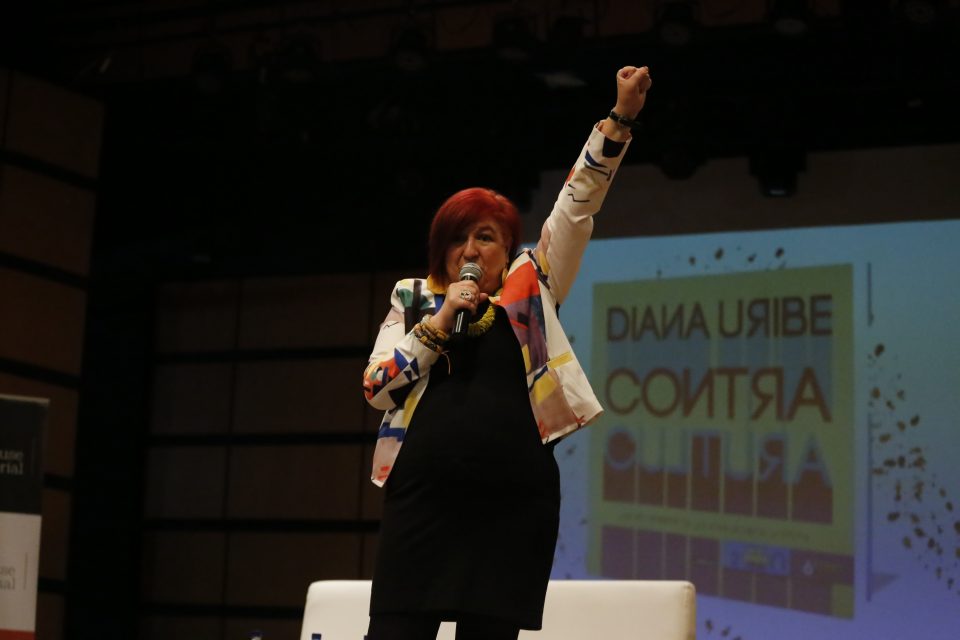
Diana Uribe was one of the highlights at this year’s FILBo.
Taking us on a journey through some of the important struggles that have shaped history, Diana Uribe talks about her new book on counterculture. Ángela Forero-Aponte reports.
Diana Uribe was one of our top picks at FILBo this year. She was at the fair to discuss the issue of human rights through her talk about countercultures, and to present her latest book, Contracultura.
She began her talk by telling us this was a long-awaited project which started as her dissertation on philosophy titled The Nation of Woodstock and Building a Utopia, then a course at Externado University called Contracultura y Postmodernidad. She was also proud to announce that her daughter, Alejandra Espinosa, was the author of the texts in this new production.
However, they encountered a problem when structuring the book, and it was the fact that so many movements in the history they planned to tell in Contracultura occurred simultaneously. In the end, they decided to present these movements in different colours.
Uribe’s open with the words of the late US political and social activist Abbie Hoffman and a masterful account of the civil rights movement, the students movement of the 1960s, hippy culture, feminism, and the gay rights movement: “We are here to make a better world. No amount of rationalisation or blaming can preempt the moment of choice each of us brings to our situation here on this planet. The lesson of the 60s is that people who cared enough to do right could change history … the big battles that we won cannot be reversed …” Uribe said that, during the 60s, the concept of human rights and freedom broadened in a way that had not been seen before.
All these movements formed individually but met on common ground during the Vietnam War. The movement that planted the seed was the civil rights movement. Uribe passionately – and for a good 40 minutes – discussed some of the main characters of the black struggle in the United States: Martin Luther King; Malcolm X; Rosa Parks, who resisted bus segregation; the Greensboro Four, a group of freshmen who refused to move out of their seats at a whites-only lunch counter; and Muhammad Ali, who refused enlistment for the war. “Society, which did not know the effects of racism, begin to realise what was actually happening, what they were rising up against: a system which was not called an apartheid, but which was one even before Apartheid.”
All of these events transformed the human conscience in a way we could not have imagined. “That spirit,” Uribe stressed, “is the force that starts to generate counterculture. Laws start to change with the right to vote, for example. However, people need to believe in themselves, to believe in their own story.”
She went on to describe the student movements, which would start their revolution while the war in Vietnam was raging. Vietnam would actually bind all these movements together, student movements, hippy culture, and all the variants of the black movement. They would all agree not to go to war, which Uribe said “happened because students are not committed to anything”.
After a pause, and some innocent laughter from the audience she elaborated: “Students are not committed to multinationals, or governments, or brands, and so they are committed to a cause, and this contributes an important element in politics: participatory democracy.”
Uribe finished her talk with a description of the feminist movement and how women started to realise their rights had not been taken into account and how, even though they were part of the movements that had been forming since the Civil Rights era, they were not considered important actors within those same movements. “In only 10 years, feminism would achieve a transformation which had not even been conceivable in 200 years.”
She also mentioned the struggles of the LGBT movement, the confrontation, which in the end “people of all conditions have had to face because others do not like the way they are. Counterculture says people have the right to be whoever they are, and not have to die because of being whoever they are, not because of their skin colour, not because of their sexuality, not because they were born male or female, and each one of these struggles will turn into rights, which will turn into laws, which will turn into different ways of coexisting in society from different perspectives, and from diversity.”
Always entertaining and raising consciousness, Diana Uribe did not miss the chance to mention that the soundtrack to all these movements was obviously rock because it created a world that did not exist before, a world for the young … and the perfect matching anthem for the talk: John Lennon’s Imagine.





